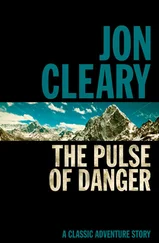Jack had never gone back to his mother. At first, out of remorse, she had come pleading to him to return; then after a while her vanity had got the better of her again and she gave up chasing him. Big Pat had died in a hurry, without expecting to, probably without meaning to, if he hadn’t been so blind with anger or sorrow or drink or perhaps all three. When it came time to settle his affairs it was found he had over-expanded and in doing so had borrowed right and left. He had left little but goodwill and a fleet of half-paid-for luggers that added up only to a man’s dreams. In solid cash they meant very little.
Jack’s mother had married again, not Mr. Garry nor Mr. Phillips nor the bloody stranger but a French woolbroker, and had gone to live in Paris. Whether she was still there, he didn’t know nor care. Whatever the Germans did to her couldn’t be worse than what she had done to his father.
And so because of his mother and because he would always remember his father’s last words— you can’t win —he had spent his life running away from women. Well, not running away from them immediately, but only when he had begun to fear they were getting a hold on him.
Good night, Silver, and she had five more days in which to strengthen her hold on him. For she did have a hold on him, he admitted, even after only four hours and two kisses. And sitting on the ferry edging its way past the wartime boom defences in the outer harbour, going over to Manly where an understanding cousin had lent him his flat for the eight days of his leave, he further admitted that perhaps this time he wouldn’t be so keen to run away. The war, that had ruined so many futures, had begun to make him think of his.
This return to Sydney, to the welcome that wasn’t there for him, had made him realise for the first time just how lonely he was. His father had been right, there was no feeling like returning home. But one needed a welcome, if the feeling was to mean anything.
They had lunch the next day at Prince’s. They sat close to a table that was fast becoming famous as the command post of certain American war correspondents covering the New Guinea front, and behind a table that was already famous as the command post of a genteel lady who covered the Society front. Gay young things were being industriously gay, keeping one eye on each other and one eye on the door in case a photographer appeared. Matrons pecked at their food like elegant fowls, also eyeing each other and waiting the advent of a photographer. Two suburban ladies from Penshurst, having a day out in Society, sat toying with their food and wishing they had gone to Sargent’s, where they could have had a real bog-in for less than half the price. Aside from Jack and the American correspondents, there were only one or two other men in the place, and they looked as uncomfortable as if they had been caught lunching in an underwear salon. Australian men still hadn’t learned to be at ease when outnumbered by women.
Silver told Jack she had to go to a meeting that night. “It’s some sort of bond rally that my mother has organised for business girls. David Jones’ have lent their restaurant. Everyone has tea and sandwiches, then this war hero gets up and says something. After that, the idea is that the girls all rush up and buy war bonds.”
“I thought they’d rush up and lay themselves at the feet of the war hero. It has better possibilities, I mean as a spectacle.”
“Well, anyway, that cuts out dinner to-night,” she said. “Unless you want to wait until after the meeting.”
“I’ll come along and eat tea and sandwiches. Maybe afterwards, just to set the girls an example, I’ll rush up and throw myself at the war hero.”
That evening, shortly after the stores had closed, he met her outside David Jones’. They went into the big gleaming store and, in a lift crammed with chattering females who looked with an appreciative eye on Jack and a critical one on Silver, they went up to the restaurant floor.
As soon as they entered the large high-ceilinged restaurant Jack saw the war hero. “You mean he’s the one who’s supposed to inspire these girls to save their money for war bonds? He’s never saved a penny in his life! I’ve kept him in spending money ever since we joined the Army on the same day.”
“Who is he?” said Silver. “My mother’s a bit on the vague side. She couldn’t remember his name.”
But before Jack could tell her, the war hero had broken away from the group around him and come plunging towards them. “You old bastard, Savanna! What are you doing here?”
“After you speak, I get up and say a piece,” said Jack. “They want the girls to get both sides of the question. You, you bludger!” he said elegantly, and shook his head disgustedly. He turned to Silver. “This is Sergeant Morley, V.C. Miss Bendixter.”
He was glad to see that Silver remained cool and didn’t gush. “My, we are honoured to-night. A real live V.C. winner.”
“I’ll say this for him,” said Jack. “Most of them don’t stay alive.”
Greg Morley’s black eyes were bright with light and his thin face was flushed under its tan. He’s just like a big kid, thought Jack. Even the thin brown face had a suggestion of boyishness about it: the features seemed thrown together above the mobile mouth, as if they had never settled into a mature countenance. He was good looking, but in a way one could never remember: there was a suggestion of impermanence, of possible change, about his face, as if when one saw him next he might have changed beyond recognition. And his face, like a young boy’s, showed every emotion.
“I’m glad I stayed alive for this,” he said, throwing an arm towards the room, laughing with a mouthful of bright white teeth. “I’m lapping it up! You should have been a hero, Jack.”
“God forbid,” said Jack. “Is Sarah here?”
“She’s over there with the mob,” Greg said. “I’ve got my own bodyguard of Army Public Relations blokes, War Loan johnnies, a photographer from D.O.I. The works, all for Greg Morley!”
“What are you going to talk about to-night?” said Silver.
“God knows.” Greg couldn’t have been more cheerful: he wasn’t a modest hero to be frightened by public adoration. “They’ve written it for me. All I have to do is deliver it.”
“What are you doing next week?” said Jack. “ Hamlet?”
But Greg couldn’t be dented. “Come and meet Sarah and the old duck who’s organising this. You’ll love her, Jack. Doesn’t know a bee from a bull’s foot about the war, but you’d think she was Lady Blamey.”
“My mother,” said Silver with mock reverence, but Greg had already left them, plunging back towards his bodyguard and the centre of interest. One of the bodyguard detached himself from the group and came towards them. He ignored Silver and looked up at Jack.
“What are you doing here?” He was a lieutenant with neat wavy hair, a soft round face and an air of authority he was just trying out. “This is a bond rally for business girls, not the Anzac Buffet. You won’t find what you’re looking for here.”
“When you speak to me address me by my rank,” said Jack, and wondered how many bonds it would sell if he smacked the lieutenant here and now. In the past he had several times felt like hitting officers, but had been restrained by second thoughts for which he had later despised himself. But if this officer went too far, there mightn’t be a second thought this time. “And speak to me again like you just have, and I’ll drop you down the lift well. Pips or no pips.”
The officer’s round face seemed to get even rounder, and his air of authority almost choked him. “What’s your name and Army number? I’ll fix you, my friend——”
Читать дальше












